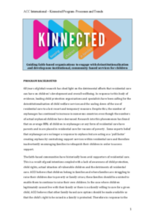Australian Christian Churches International (ACCI) is an organization whose mission is to “transform communities and nations, one life at a time, by developing holistic sustainable solutions to combat injustice, poverty and reinstate the value of life” by promoting “equal access to the rights and services that protect life and human dignity.”
To this end, ACCI established the Kinnected program, which is working toward the reduction in the use of residential care of children and aims to assist children within the context of their families. Kinnected works across 8 countries in order to: develop family-based alternative care, provide high quality short-term care as a last resort and temporary option, assist long-term residential care programs to undergo deinstitutionalisation, develop reintegration and reunification programs, and develop child-centred community development programs.
Kinnected also seeks to influence the broader faith-based community towards the same goals. Kinnected has worked alongside government departments, field workers, strategic partners, associates, churches, faith based organisations, orphanages, foundations, funding bodies, boards and concerned individuals around core areas or processes, such as education and awareness of child rights, detriments of institutional care and deinstitutionalisation, capacity building to prepare staff and key stakeholders to undergo deinstitutionalisation and develop alternative family and community based services, understanding national laws, alternative care policies, frameworks and child protection schemes, and more.
This document provides an outline of the program’s operation, including its 11 areas of focus (such as promoting education and awareness of children’s rights, capacity building, and engaging children and families in the program planning), and the seven stages of programming. Kinnected’s first stage of work is to create organisational buy-in, then to secure that buy-in from residential care managers. The third stage is the planning for change stage and the fourth is implementing that change. The fifth stage involves monitoring communication processes, the sixth is monitoring the reintegration process, and the seventh is the formal evaluation of the Kinnected program, to be conducted in 2015. The activities within each of these stages are described in detail in the outline.
The document also offers an overview of the lessons learnt of the Kinnected program. Lessons learnt have been drawn from anecdotal evidence gathered through Kinnected’s experience over a three-year period as well as results from the program’s first round of qualitative interviews with Kinnected partners and organisations. The document offers a total of 20 key lessons from the program’s three years of operation. Some of the lessons that Kinnected has learnt include: to provide both education and practical assistance, the average time it takes to move from exposure to action is about 18 months, to package the information shared into smaller topics and to stagger the delivery of this information, and to help organisations envision themselves “post-transition.”

